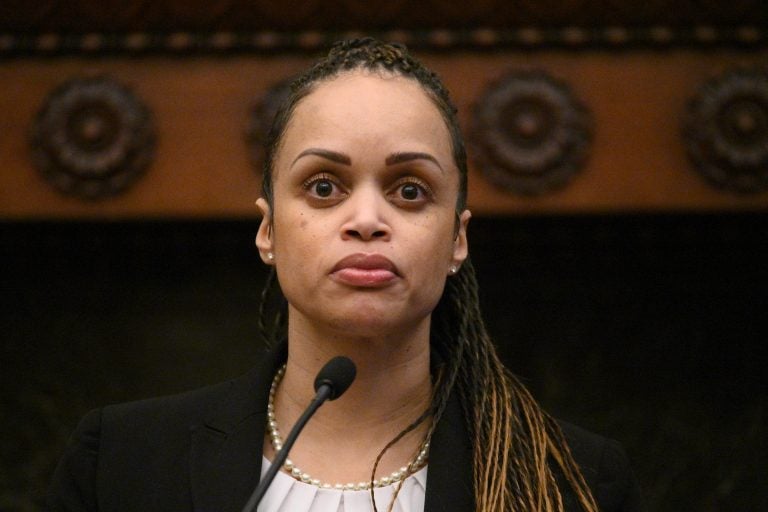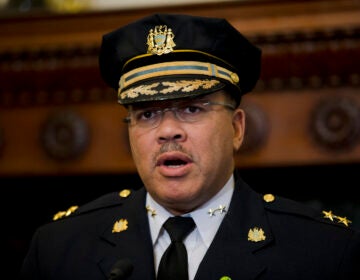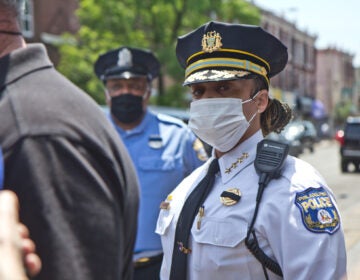Philly police commissioner alters use of force policy after tear gas, warns about press arrests
Some in the department questioned why guidelines like this weren’t issued sooner.

Danielle Outlaw, being introduced by Mayor Jim Kenney as the new commissioner of the Philadelphia Police Department, on Dec. 30, 2019. (Bastiaan Slabbers for WHYY)
A day after Philadelphia police came under fire for the handling of a demonstration on I-676, PPD Commissioner Danielle Outlaw is ordering the department to revise its use of force guidelines.
A memo obtained by Billy Penn and WHYY shows officers will be required to report all use of force live on their radios, rather than as procedural paperwork after the fact.
“Effective immediately, and until notified otherwise, all uses of force must be reported via Police Radio, to ensure we can properly defend our actions when we are ultimately challenged,” Outlaw wrote in the department-wide memorandum.
On Monday, officers tear-gassed an otherwise peaceful crowd that had descended into the I-676 interstate during one of the many protests of police violence and racism that have swept the city and nation. Officers discharged canisters at a mass of protesters who were trapped on the highway trench with nowhere to run. In one widely circulated video, an officer can be seen ripping off protesters’ facemasks in order to pepper-spray them at close range.
In the memo, Outlaw noted the department hasn’t used “less-than-lethal munitions” in recent history.
She also hinted at the recent arrests of several local journalists, instructing rank-and-file police to allow reporters to do their jobs “unless extenuating circumstances exist.”
In two separate incidents since Sunday, officers detained WHYY education reporter Avi Wolfman-Arent and Inquirer education reporter Kristen Graham. Both identified themselves as press who were on assignment covering protests.
Despite these two reporters’ association with recognizable news outlets, Outlaw noted that in general officers might find it “hard to define the ‘press,’” but instructed police to be “as accommodating as possible…even when we have a curfew.”
“If you are uncertain about who is considered to be a member of the press, contact a supervisor for directions,” the top cop wrote. “Please remember, the press are not only entitled to access, they have a right to it.”
Some police sources, speaking on the condition of anonymity, praised the nature of the memo but questioned why standard operating procedures like this had not been communicated earlier. A spokesperson for the department declined further comment on the memo.
Outlaw also seemed to allude to another incident on Monday night in Fishtown in which police appeared to tolerate a group of armed men that appeared in front of the 26th District Police station after the 6 p.m. citywide curfew. The group, some of whose members were armed with bats or other weapons suitable for hand-to-hand combat, had purportedly assembled to protect police officers.
Without mentioning specifics, Outlaw instructed officers not to associate with vigilantes or other groups of untrained civilian groups.
“The Department will not condone individuals or groups actively seeking out and engaging criminals,” the memo states. “We cannot ignore the frustration of some communities and the desire to help law enforcement, but these actions undermine officer safety. Please use your community resources to dissuade any individual or groups from this activity.”

Get daily updates from WHYY News!
WHYY is your source for fact-based, in-depth journalism and information. As a nonprofit organization, we rely on financial support from readers like you. Please give today.







